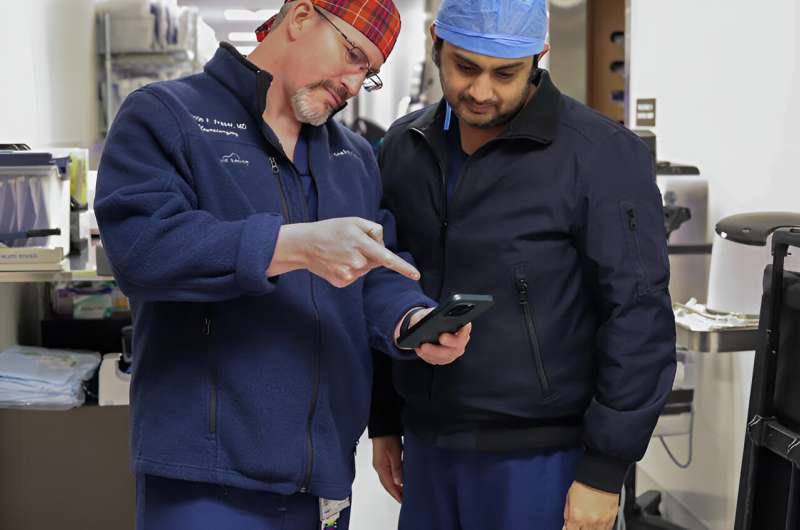
Justin Fraser, M.D., and Muhammed Fawad Ishfaq, M.D., are able to quickly review patient scans through their phones. Credit: Lily Wilder/University of Kentucky
Justin Fraser, M.D., and his University of Kentucky colleagues have a phrase they frequently use to convey the urgency of their care: “Time is brain.”
That is because in their role as stroke doctors, every second counts.
For example, Fraser said that if a patient has a large vessel occlusion, an obstruction of one of the larger arteries in the brain, the patient is losing 2–3 million neurons per minute on average. The need for urgent stroke care is dire, as it is the fifth-leading cause of death and a major cause of disability in the U.S., according to the American Stroke Association.
Using innovative artificial intelligence (AI) technology, faculty at the UK College of Medicine are promoting efficiency in patient triage.
The neurology department adopted Viz.ai in 2020, a software application that Fraser said is changing the game for their stroke program. Rather than replace the human element that is crucial to compassionate and comprehensive treatment, the app complements the personal care provided by UK HealthCare physicians.
Prior to Viz.ai, when a patient came into UK HealthCare with signs and symptoms of stroke, that patient would receive a computed tomography (CT) scan. Then a resident would see the patient, call an attending physician, and they would study the films. Such diagnostic evaluation and treatment triage was even more complicated when patients presented to surrounding community hospitals trying to transfer the patients to UK.
That took time, and time is valuable.
“With this tool, as soon as that CT scan is performed, it is automatically sent to us on our phones. Within seconds, we receive a notification,” Fraser said. “In many ways, it is bringing the team virtually to the patient’s bedside.”
This is particularly helpful for Fraser and his neurointerventional colleagues, who serve patients in nearly 30 hospitals across the Commonwealth. When a patient undergoes a stroke scan, it can be instantaneously reviewed to determine if that patient needs to come to UK for further treatment such as thrombectomy. UK HealthCare is a Comprehensive Stroke Center, the highest rating a stroke center can achieve. Thrombectomy is a procedure by which neurointerventionalists use minimally invasive access to emergently reopen blocked blood vessels in the brain; this can stop the stroke from becoming permanent.
The Viz.ai app also allows Fraser and his fellow team members to communicate in a Health Insurance Portability and Accountability Act (HIPAA)-protected environment.
As of 2022, Viz.ai had signed with more than 900 hospitals and was approved by Medicare, according to Forbes. A paper by Chandrabhatla, et al., published in the Journal of Clinical Medicine, noted that Food and Drug Administration-approved AI/ML-enabled technologies for stroke diagnosis and management “have proven to be powerful tools in improving the efficiency and accuracy of patient care decisions by physicians.”
Over time, Fraser sees AI as a vital tool for data tracking to continue improving patient care.
“With the way the app is set up, we can track turnaround time and how quickly we helped patients receive the treatment they need,” Fraser said.
While there is much to learn about the application of AI in medicine and health care, Fraser and his team see a lot of promise in how it can help patients with urgent needs, like those facing strokes.
Citation:
AI helping bring vital stroke care ‘virtually to the patient’s bedside’ (2024, January 19)
retrieved 19 January 2024
from https://medicalxpress.com/news/2024-01-ai-vital-virtually-patient-bedside.html
This document is subject to copyright. Apart from any fair dealing for the purpose of private study or research, no
part may be reproduced without the written permission. The content is provided for information purposes only.
>>> Read full article>>>
Copyright for syndicated content belongs to the linked Source : Medical Xpress – https://medicalxpress.com/news/2024-01-ai-vital-virtually-patient-bedside.html










